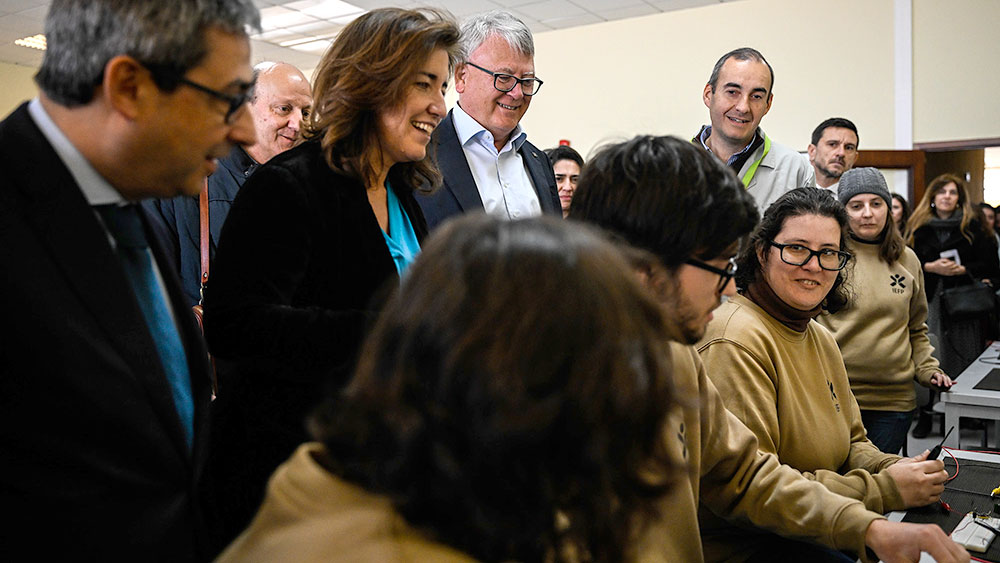
The European Commissioner for Jobs and Social Rights, Nicolas Schmit, was in Portugal on 16 and 17 February. Alongside high-level meetings with the country’s Prime Minister Antonio Costa, national ministers and members of the national Parliament, the Commissioner also met with the national co-ordinator for the European Year of Skills 2023.
While in the country, the Commissioner visited some organisations that highlight how the European Social Fund (ESF) has worked to build training schemes in Portugal over the past several years – setting the scene for continued funding to develop the upskilling and re-skilling in the country for years to come.
Speaking to Portugal’s youth about skills
Accompanied by Ana Mendes Godinho, Portuguese Minister for Labour, Solidarity and Social Security, and Secretary of State for Labour, Miguel Fontes, the Commissioner spoke to 30 young people taking part in Portugal’s national ‘UPskill’ Programme (Programa UPskill), and their mentors. UPskill is a joint initiative involving the Digital Business Community and academia that has responded to the growing demand for qualified talent in Information and Communication Technology (ICT). It teaches new skills to unemployed or underemployed people in various areas of ICT and provides traineeships in companies. The programme is based on a multi-stakeholder approach and is aligned with the objectives of the European Year of Skills – to help people get the skills in demand for quality jobs. The young people meeting the Commissioner shared how UPskill has played a life-changing role in their personal and professional development.
Commissioner Schmit said: “I had an excellent visit to UPskill. This very challenging programme provides intensive training, in cooperation with companies, helping people to upskill and find new jobs in the digital sector. It was really great to hear about their life-changing experiences”.
The ESF in Portugal – vital for skills
The Commissioner also visited the Professional Training Centre of Santarém and the Professional Training Centre for the Metallurgical and Metal-Mechanical Industry. Currently funded under the European Social Fund (ESF), the organisations work with people from a variety of backgrounds to build their skills in a professional environment.
The centres’ activities include apprenticeship opportunities for young people who have completed some post-secondary education. The course enables participants to receive a valuable double certification, thanks to a dual learning system that combines both theoretical and on-the-job training. This can help them find immediate employment or continue their studies towards higher education.
The training courses also promote social inclusion by providing basic skills courses for adults with low levels of qualifications or who are missing most of the skills they would need to find a job, allowing them to obtain a school and/or professional qualification that is adjusted to both their needs – and relevant to the Portuguese labour market.
The centre also offers basic Portuguese language training for immigrants, helping them to find a job and integrate into Portuguese society. Activities include language immersion, socio-cultural activities and informing students on the rights and duties of foreign citizens in Portugal.
Professional traineeships for unemployed and job seekers, in particular young people not in employment, education or training, are also available. These traineeships support the transition between the education and training system and working life, as well as the professional integration of unemployed people through practical work experience.
Skills for the future
The European Social Fund Plus (ESF+) in Portugal, with a budget of €7.78 billion, is investing in people, and creating new opportunities over the programming period 2021-2027. This includes helping people to build the skills they need to develop in their jobs or find new ones. Once implementation gets off the ground, ESF+ projects will promote a mindset of reskilling and upskilling and help companies – with a focus on small and medium-sized enterprises - to address skills shortages. Portugal has set itself ambitious skills and employment national targets to deliver on the European Pillar of Social Rights Action Plan by 2030, aiming at reaching an employment rate of 80% by 2030, and at creating a culture of life-long learning where 60% of adults participate in training each year by that time. Funding from the ESF+ in Portugal will contribute to achieving these targets.



